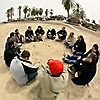Audio Version Of The Blog – 1/4/24
Listen to an Audio Version of the Blog
Download:MP3 Audio

Listen to an Audio Version of the Blog
Download:MP3 Audio

Michael Laitman on the Times of Israel: “Rabbi Shimon bar Yochai Exits the Cave, Dawning Our Era”
We live in such times today where the more we develop without cultivating unifying relations among each other, then the more a repugnant stench of division and hatred darkens our lives. Today, more than ever before, we need to nurture genuine love above our divisive drives, the kind of love that the Torah depicts and that Rabbi Shimon bar Yochai expounded on in the cave with his nine friends.
For 13 years, Rabbi Shimon and his son Rabbi Elazar dwelt in a cave in Peki’in. Later, eight more wise disciples joined them, and collectively, they wrote The Book of Zohar—a commentary encompassing the Torah, the Prophets and the Scriptures.
Upon delving into The Zohar‘s intricate interpretations by that ten, we can recognize the high level of the Torah’s encryption. The simplistic historical narrative with numerous plots and human characters, both good and bad, is by no means the sole way to comprehend it.
In the introduction of The Book of Zohar, written while Rabbi Shimon and Rabbi Elazar were secluded in the cave, there exists a distinct article named “Rabbi Shimon’s Exit from the Cave.” This piece beautifully illustrates how physical history intertwines with spiritual teachings.
Historically set around 2,000 years ago during Roman rule in Israel, the story narrates Rabbi Shimon and his son Elazar evading the Romans, seeking refuge in a Galilean cave. Despite the cave’s ruin by an ancient earthquake, the story remains untouched by time:
Rabbi Pinhas was regularly before Rabbi Rehumai, by the shore of the Sea of Galilee. A great and elderly man was Rabbi Rehumai, and his eyes grew weak. He said to Rabbi Pinhas, ‘Indeed, I heard that Yochai, our friend, has a gem, a good stone, a son. I looked in the light of that gem, and it is as the illumination of the sun from its sheath, illuminating the entire world.’” – Zohar for All, “Rabbi Shimon’s Exit from the Cave.
This peculiar story portrays the Kabbalistic sage Rabbi Shimon bar Yochai’s son, a young boy revealing himself as a luminous wonder and a true Torah disciple. At a deeper level, it shows that unveiling the inner essence of The Book of Zohar requires a connection between generations, between “fathers” and “sons.”
Further along, the article describes Rabbi Pinhas attempting to contact the missing Rabbi Shimon, resorting to nature’s elements for communication. He reaches out not through chirping birds but via spiritual means, connecting with Rabbi Shimon through a degree known as “Chai” (Heb. “animate”), foreseeing his emergence from the cave and the placement of The Book of Zohar heralding the Messiah’s era.
When the ten friends finished composing The Zohar and exited the cave, Rabbi Shimon ordered its burial until the generation capable of ending spiritual darkness, destruction and exile—initiated and continuing since his days—would arise. In this awaited generation, there would be people who would grow an awareness of the evil of the egoistic human nature, which divides people from one another and from the source force of nature that the sages of The Zohar had revealed. Such people would go on to seek a higher form of unity among themselves and with nature’s force of love, bestowal and connection—as The Zohar anticipated.
Now that The Zohar has been revealed on a mass scale, Kabbalist Yehuda Ashlag (Baal HaSulam) crafted a commentary named the “Sulam” (“Ladder“). This Sulam commentary of The Zohar is crucial for ascending to the lofty treasure that it unlocks. Its discovery and arrangement indicate the era of the Messiah, i.e., the era when the upper force of love and bestowal emerges to “pull” (“Messiah” from the Hebrew word for “pulling” [“Moshech”]) us out of our egoistic and divisive relations in an ever-flourishing ascent to absolute love, as it is described in the Torah and The Zohar:
There is love, brotherhood, and truth in the Torah. Abraham loved Isaac; Isaac loved Abraham; and they were embraced. And they were both gripped Jacob with love and brotherhood and were giving their spirits in one another. The friends should be like them and not blemish them, for if love is lacking in them they will blemish their value above, that is, Abraham, Isaac, and Jacob.” – Zohar for All, Ki Tissa [When You Take], Item 54.
[323036]
 Question: If we receive some answers from the Creator, but then we cannot follow them, what does this mean? Does it mean that we lack His greatness?
Question: If we receive some answers from the Creator, but then we cannot follow them, what does this mean? Does it mean that we lack His greatness?
Answer: Yes, it means that you have already left this area, and therefore you do not feel the Creator. Try to connect with the friends and turn to the Creator together.
Question: How can I recognize the Creator’s answer to my question?
Answer: If you have a question and insistently ask for an answer, then gradually you begin to feel the Creator’s answer in your mind.
Question: Could it happen that the answer we receive will become irrelevant after some time?
Answer: It can. Then you should ask a new question.
[322792]
From the Daily Kabbalah Lesson 12/21/23, Writings of Baal HaSulam “What Is the Exaltedness of the Creator?“
Related Material:
How Can I Understand the Creator’s Answer
How Can We Get the Creator’s Answer
How To Deserve Answer From The Creator
 Question: Is it possible to soften my heart with the help of individual prayer and free it to receive the Creator? If it is possible, then how can I correctly build the intention for this individual prayer?
Question: Is it possible to soften my heart with the help of individual prayer and free it to receive the Creator? If it is possible, then how can I correctly build the intention for this individual prayer?
Answer: I think it is very difficult to do this alone. It is better if all the friends in the ten ask together with you.
Question: Should they ask with me or for me?
Answer: With you and for you, and all together for someone, it does not matter. The main thing is to turn to the Creator.
Question: How do we prepare to stand before the Creator with a true prayer that He will answer?
Answer: Every day, in every appeal to the Creator, we must ask Him for the same thing, the most important thing is to have a connection with Him through the ten.
[322795]
From the Daily Kabbalah Lesson 12/24/23, Writings of Baal HaSulam “My Soul Shall Weep in Secret – 1“
Related Material:
To Be Included in Common Request
The Power Of The Common Prayer
Everything Is Obtained By The Power Of Prayer
 Question: What should we focus on more in spiritual work: on the greatness of the teacher who constantly guides us or on the greatness of the ten?
Question: What should we focus on more in spiritual work: on the greatness of the teacher who constantly guides us or on the greatness of the ten?
Answer: The teacher exists as if from the side. You incorporate in the ten, and together with the ten you strive to the Creator.
The teacher teaches you, supports you, guides you, and pushes you, but he is still like an outsider. Of course, you get the direction, the strength, the examples, the language, everything from me.
Nevertheless, the main thing is to strive through friends only to the Creator, to be in alliance with them and fly to the goal.
[322799]
From the Daily Kabbalah Lesson 12/25/23, Baal HaSulam “Choosing Labor“
Related Material:
A Spiritual Orientation Toward The Creator
The Three Components Of The Ascent
The Flight Path Into The Spiritual
 Question: We strive for an emotional understanding of reality through our good connections. But Baal HaSulam writes that the mind is the closest garment to the soul. Why is it the mind and not the feeling?
Question: We strive for an emotional understanding of reality through our good connections. But Baal HaSulam writes that the mind is the closest garment to the soul. Why is it the mind and not the feeling?
Answer: We need the mind because through it we comprehend our feelings, analyze, explore, and reveal them. Therefore, it is impossible without the mind, but without feelings nothing can happen at all. The wisdom of Kabbalah speaks about feelings.
Question: How can I force myself to act against my will because the desire is inside me, and the action is outside? And how does one understand that the commandments do not need intention?
Answer: Try to determine what your desire is and to whom you directed. And at the same time, check your intention. The direction of desire is the intention.
Question: Our priority is to work on the heart. But we all strive to be worthy of faith above reason, which means rising above reason. Then it is not clear what reason is for?
Answer: To rise above it or we will not be able to comprehend spirituality. By rising above reason, we enter spirituality.
Question: How can love be analyzed correctly if you are afraid of losing it?
Answer: Hold on to it, develop it all the time, do not be ashamed of it, and then everything will be fine.
[322598]
From the Daily Kabbalah Lesson 12/17/23, of Baal HaSulam “The Action Affects the Thought“
Related Material:
Questions about Spiritual Work—49
Questions about Spiritual Work—48
Questions about Spiritual Work—47
 Question: You say we must correct the connections in the ten and pray for our friends. How does one pray for friends if their behavior irritates you?
Question: You say we must correct the connections in the ten and pray for our friends. How does one pray for friends if their behavior irritates you?
Answer: That is wonderful! It means you have something to pray for and ask the Creator that you will have the right attitude toward your friends so that you constantly forgive and justify them although you accept each other with hostility.
Question: How can we maintain a connection with the Creator when it seems there is no Creator and you see your friends as uncorrected?
Answer: This is similar to how a mother leaves small children in a room, goes out, and closes the door behind her, but she watches them from afar and sees what is happening with them. So it is with you.
You feel that you are forgetting that the Creator is constantly among us, inside us, and around us, and under no circumstances should we leave this fact behind. Therefore, there is nothing we can do here except constantly be careful not to throw the Creator out of sight. Otherwise, we fly out of the real world and from real feelings.
[322639]
From the Daily Kabbalah Lesson 12/19/23, Writings of Baal HaSulam “She Is Like Merchant-Ships“
Related Material:
In The Circle Of Helpers
The Story Of Jacob And Esau Teaches Us How To Trick Our Egoism
Immense Egoism, And An Absolute Love
 Question: The first commandment of the Torah is trepidation before the Creator. Should I fear that I cannot implement the Creator’s commandments?
Question: The first commandment of the Torah is trepidation before the Creator. Should I fear that I cannot implement the Creator’s commandments?
Answer: Yes, because the Creator’s commandments are the laws of nature. If we implement them, we feel in harmony with nature. And if not, then we experience their negative consequences on ourselves.
Question: So I have a choice: I can follow them or not. So are these not laws like the law of gravity that I must observe?
Answer: These are somewhat different laws, but have the same effect as physical laws. If we ignore them, we are punished for it.
But we must remember that the laws of the Torah apply to a person’s relationship to the world, to his own kind, that is, their difference from the physical laws of nature, which apply to the level of inanimate, vegetative, and animate nature, including humans.
The laws that we study in the science of Kabbalah apply to relationships between people and between people and the Creator (the supreme governing force).
[322365]
From KabTV’s “Introduction of The Book of Zohar” 12/10/23
Related Material:
Arvut (Mutual Guarantee)—The Spiritual Law
The Law Of Roots And Branches – The Most Important Law In Kabbalah
The Universal Law Of Harmony
 Question: How can you check whether a person is in touch with the Creator or not? Who is that inner voice that one constantly talks to?
Question: How can you check whether a person is in touch with the Creator or not? Who is that inner voice that one constantly talks to?
Answer: It is him, himself.
Question: There is confusion here. On the one hand, it says: “There is none else besides Him,” i.e., all thoughts of a person come from the Creator. So, is it Him after all?
Answer: It is Him. But the fact is that man does not see the Creator and does not feel Him. He simply acts as directed by the Creator, establishing the necessary connections in the group with his friends who strive for the same goal.
Thus, heading toward one goal, they gradually change from beings who only want to receive into people who want to bestow.
Thats is the gradual approach to the Creator, likeness to Him.
[322253]
From KabTV’s “Practical Kabbalah” 12/5/23
Related Material:
Coming Outside Of Ourselves In Order To Hear The Creator
Speech – Thought – Action
How Can We Overcome The Ego?
Preparation to the Lesson
1st part of the Lesson — Writings of Rabash, “What It Means that ‘Law and Ordinance’ Is the Name of the Creator in the Work”
2nd part of the Lesson — Writings of Baal HaSulam, “Study of the Ten Sefirot,” Vol. 2, Part 6, Item 4”
3rd part of the Lesson — Writings of Baal HaSulam, “Disclosing a Portion, Covering Two”
Selected Highlights